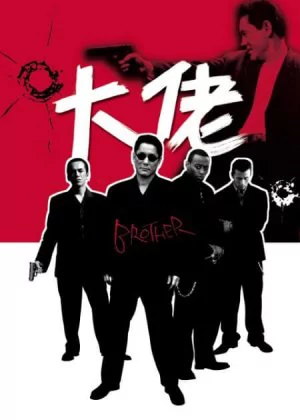Brother
Right in between Kikujiro no Natsu and Dolls (the start of a 10-year long break from Yakuza cinema), Takeshi Kitano travelled to America to submerge himself into organized crime territory one last time. The result is Brother, a somewhat forgotten and often discarded Kitano film. It's not even that it's particularly disliked, people just don't mention it very often when talking Kitano films, so I was quite curious to see how it had held up over time.

Some foreign directors travel to America to blend in and make an all-American movies, others go there simply to make their film set in America. Kitano is definitely the latter kind. He took half a crew and half a cast with him from Japan, mixed in the Americans and simply made a bonafide Kitano on American soil. Opinions may differ, but I think that's by far the most interesting path to take. It allows the audience to see a familiar setting (assuming they've been watching a fair amount of American films) through a foreign eye, creating something entirely new and unique.
In Brother Kitano takes his typical Yakuza setting and transports it to Los Angeles. While the movie starts off in Japan, Kitano's character is soon pressured to leave the country. He obliges and moves to America to visit his cousin Ken. Ken and his gang like to dabble in low-profile crime and are looking for a way up. When Kitano arrives, he teaches the boys a lesson or two and starts his own little Yakuza gang, but not without annoying some of the neighbouring gangs.
The move to America pretty much allowed Kitano to work a bunch of different crime syndicates into the story. The Chinese, the Mexicans and of course the Italians all play their part in Brother. Thankfully it didn't turn out to be one of those "kicking ass in a foreign country" type of films (often of the American persuasion) and Kitano's plans are met with a number of serious hiccups, leaving him to struggle to keep his head above water.

On the visual side of things Brother is very much oldskool Kitano, staying close the style found in Hana-bi and Sonatine. That means that the setting may look a little grim, lacking color and detail, but the framing of the shots is exquisite and the editing is still as snappy and surprising as ever. It's definitely not Kitano's best-looking film, but Brother has a very clear, distinct visual style that's characteristic for Kitano's early Yakuza films.
The soundtrack too is vintage Kitano, mostly due to Joe Hisaishi still being on board back then. It's not Hisaishi's best work as it can't really compete with the soundtracks of Dolls, Kikujiro and Hana-bi, but it does the job. At its worst it's rather tepid and lazy, hiding in the background, at its best it's warm and soothing, laying het groundwork for Kitano's playful Yakuza scenes. Luckily the main theme is a strong Hisaishi track that is repeated several times during the key scenes of the film, giving the film some extra shine.
The acting is pretty much all over the place too. Kitano is superb as head of the Yakuza gang, Japanese regulars like Osugi, Terajima and Ishibashi fit their parts perfectly (Terajima in particular is amazing). Their American counterparts have a considerably harder time fitting in, with some pretty weak performances from the lower-ranking members and adversaries. That could've been a problem, were it not for Omar Epps (the American lead) who clearly hit it off with Kitano. I'm not a big fan of Epps, but once the two start fooling around there's some real chemistry there.

If you've already seen a couple of Kitano's Yakuza films you should know what to expect from Brother. The sudden bursts of aggression, criminals goofing off while resorting to childish games, Kitano's trademark brand of poetic violence, it's all right here. To hardened Kitano fans the ending won't come as a surprise either. What the film loses in originality though, it makes up for in refinement. Brother is the culmination of Kitano's first 10 years as a director, showing off one last time what he had learned before he would go on to reinvent himself.
Brother is not an American Kitano film, it's a Kitano film set in America. If you liked Sonatine, Hana-bi and 3-4x Jugatsu then you really can't go wrong with this one. That is, if you can accept Epps as Kitano's prime henchman. There's some real chemistry between the two actors though, so that shouldn't be too much of a problem. Brother is a fine film that stands proud amongst Kitano's other films and doesn't deserve to be forgotten.
